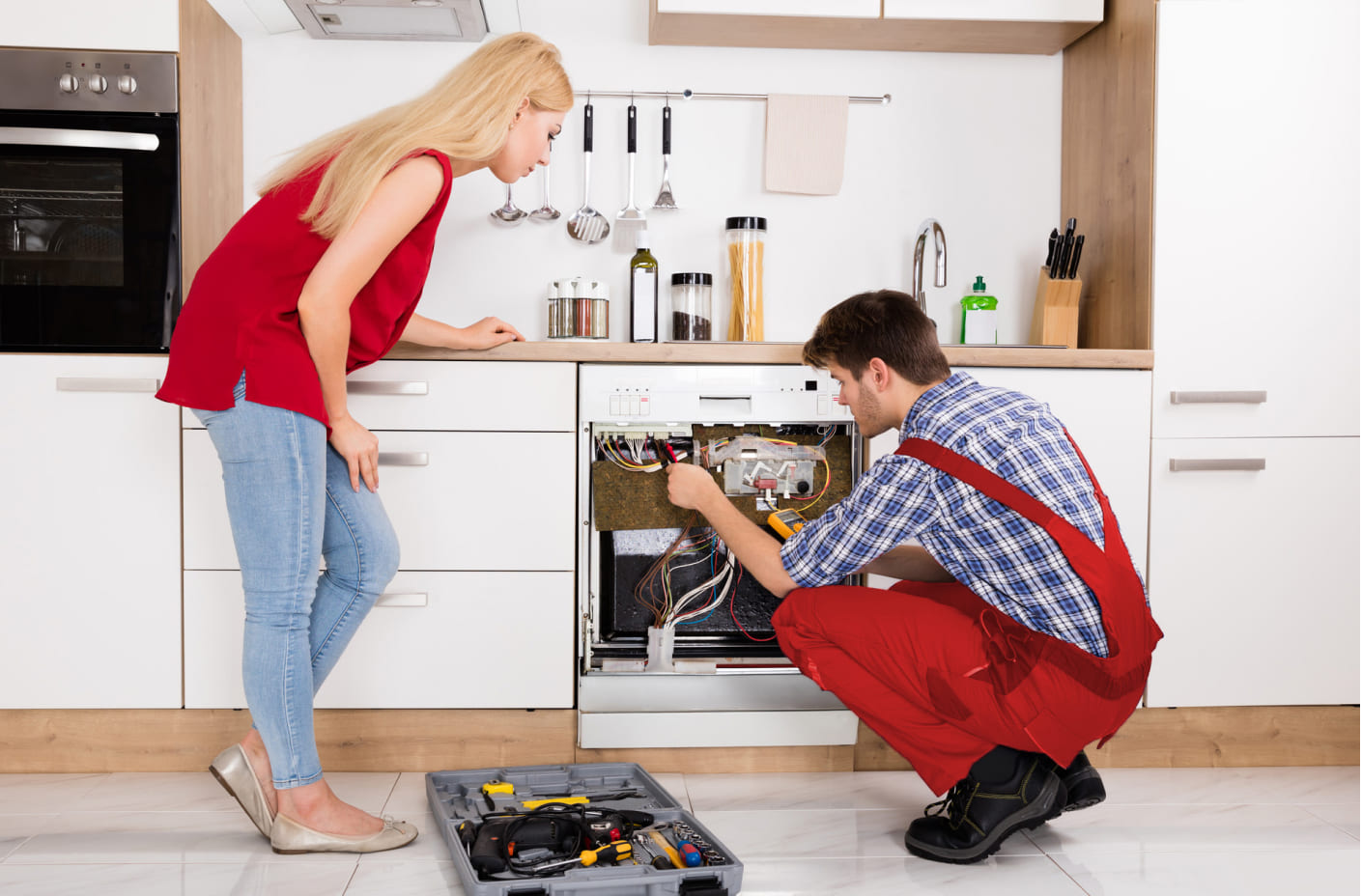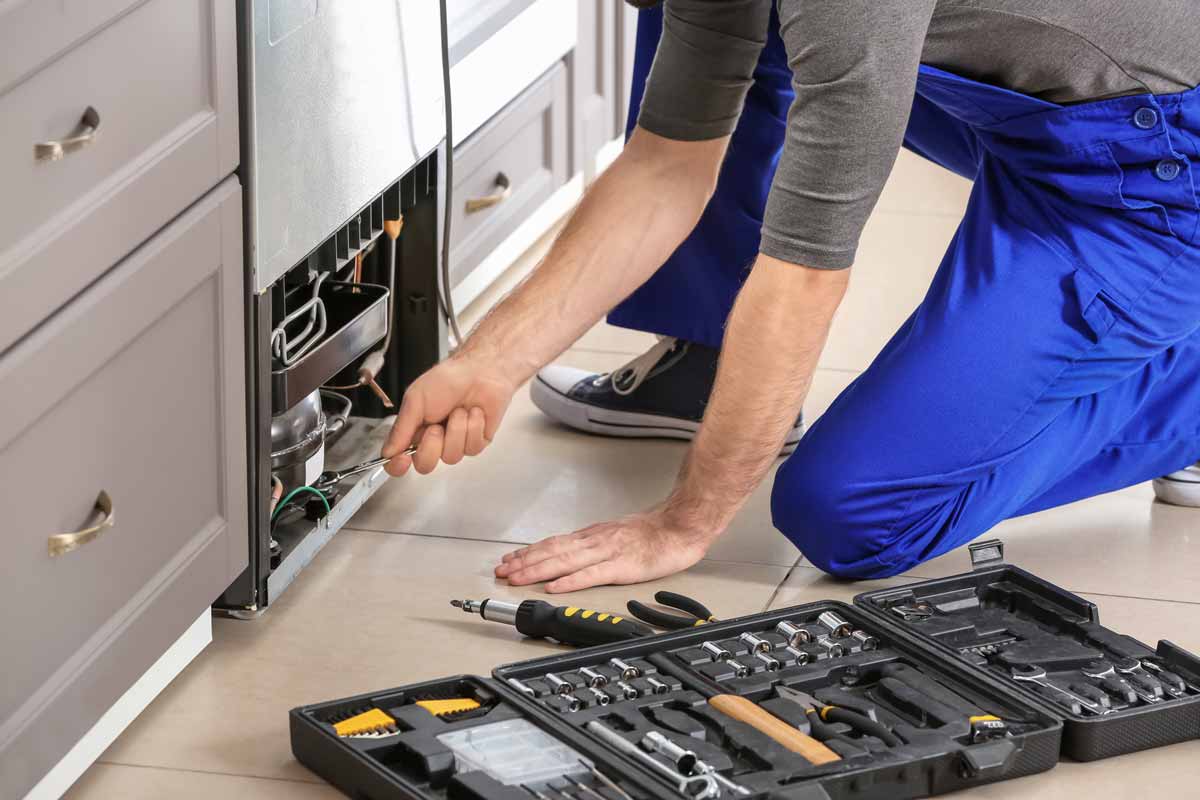Why Your Washing Machine Won’t Drain – Dependable Refrigeration & Appliance Repair Service Washing Machine Repair
Why Your Washing Machine Won’t Drain – Dependable Refrigeration & Appliance Repair Service Washing Machine Repair
Blog Article
The Ultimate Guide to Understanding Home Appliance Repair Work in your home
When your refrigerator stops cooling down or your oven rejects to warmth, it can feel overwhelming. Recognizing appliance repair service at home can conserve you money and time. You'll discover to recognize signs, make use of crucial devices, and comply with a systematic troubleshooting process. But before you begin, there are crucial safety preventative measures you need to think about. What are the most typical troubles, and exactly how can you repair them? Let's check out the fundamentals.
Usual Home Appliance Issues and Their Symptoms
When your appliances begin acting up, it's important to acknowledge the indicators early on. Neglecting them can bring about bigger problems and costly repairs. For example, if your refrigerator isn't cooling correctly, you could discover warm areas or condensation creating. This can show a stopping working compressor or an obstructed vent.Your dish washer might reveal problems through unclean dishes or uncommon sounds during cycles. If you hear grinding or clanking, it's time to investigate.A washing maker that won't spin or drain can leave you with soggy laundry, recommending a clogged drain or a malfunctioning pump.Lastly, if your oven's temperature appears off or it takes forever to pre-heat, you might be managing a faulty thermostat. By staying sharp to these signs, you can address problems before they escalate right into major repair services.
Important Tools for Appliance Repair
When you're taking on home appliance repair work in your home, having the right devices is crucial. Standard hand tools like screwdrivers and pliers will certainly aid you take apart and fix numerous devices, while electric screening devices guarantee you're working securely with circuitry. Allow's go over what you need to begin on your fixing trip.
Basic Hand Tools
Having the right tools is important for effective home appliance repair work in the house. Start with a reliable screwdriver set, consisting of both flathead and Phillips kinds, as screws prevail in device setting up. Pliers are likewise important; they aid with gripping, twisting, and cutting cords or little parts. A pair of needle-nose pliers can get to limited spots quickly. You'll need an excellent adjustable wrench for tightening or loosening nuts and screws. An energy blade comes in handy for reducing through product packaging or insulation. Do not forget a durable workbench or surface to securely arrange your devices and components. With these fundamental hand tools, you'll be well-prepared to tackle most appliance repair work that come your means.
Electric Screening Instruments
Along with fundamental hand devices, electrical testing devices play a vital role in appliance repair. These devices assist you identify electric problems and guarantee devices operate safely. A multimeter is important; it determines voltage, current, and resistance, permitting you to pinpoint problems rapidly. A non-contact voltage tester is an additional must-have, letting you identify live cables without making direct contact, improving your security. Secure meters are great for gauging present flow in cables without separating them, conserving you effort and time. Additionally, circuit testers can quickly check if outlets are working effectively. By utilizing these tools, you'll streamline your troubleshooting process and improve your repair abilities, making device upkeep a great deal much easier.
Step-by-Step Guide to Diagnosing Device Issues
When your home appliance acts up, it can be discouraging, but identifying the problem doesn't have to be overwhelming. You'll find out to determine common problems and apply efficient fixing methods. Let's stroll via the steps to get your home appliance back in functioning order.
Typical Device Problems

Troubleshooting Strategies Clarified

Repairing Significant Kitchen Devices: A Closer Look
Have you ever wondered exactly how to take on usual problems with your kitchen area devices? Repairing significant cooking area devices like fridges, stoves, and dish washers can be less complicated than you think. Start by determining the issue-- whether it's a refrigerator not cooling or an oven that will not heat up. Usually, a basic reset or examining the source of power can resolve the issue.For refrigerators, tidy the condenser coils and check the door seals. If your oven's not home heating, evaluate the burner and thermostat. Dish washers may simply need a tidy filter or a reset to obtain them back at work. Constantly unplug the appliance before diving right into repair work to guarantee your safety.Don' t fail to remember to consult the individual handbook for particular fixing pointers connected to your design. With a bit of patience and the right tools, you can confidently deal with device repairs and save cash in the procedure!

Troubleshooting Laundry Equipments: Tips and Techniques
When your laundry devices begin acting up, it can feel overwhelming, however troubleshooting them does not need to be a problem. Beginning by checking the power supply. Verify the appliance is plugged in and the electrical outlet is functioning. Next, examine the door or cover button; a faulty switch can stop the device from operating.For washing machines, if it's not spinning, examine for unbalanced tons. Rearranging the garments might address the concern. If your dryer isn't heating, clean the dust filter and examine the air vent for blockages.Listen for unusual noises; they can indicate a problem. If your appliance is dripping, check the hose pipes for fractures or loose links. Document any type of error codes displayed on electronic displays, as they can guide you in determining the problem. Speak with the individual handbook for details fixing ideas related to your model.
Safety And Security Preventative Measures to Take Throughout Fixes
Prior to you start any kind of appliance repair work, it's vital to focus on safety and security to prevent mishaps or injuries. Unplug the appliance or transform off the circuit breaker to guarantee no power reaches it while you work. Usage insulated devices to reduce the threat of electric shock. Wear security goggles and handwear covers to protect yourself from sharp sides or debris (Dependable Refrigeration & Appliance Repair Service Washer repair near me).Make particular your work space is neat and well-lit, so you can see what you're doing. Keep kids and pet dogs far from the location to avoid interruptions and possible hazards. If you're dealing with gas devices, be extra mindful; look for leakages before proceeding.Take your time, and do not hurry with fixings. If you really feel unclear concerning any type of action, it's much better to pause and research than to presume. Complying with these precautions will help create a safer environment for your DIY appliance repair service task
When to Call a Professional for Help
How do you understand if it's time to hire an expert for device fixings? If you've attempted basic troubleshooting without success, it's a clear sign. For instance, if your home appliance still will not begin or shows unusual sounds after resetting it, don't think twice to look for expert help.When you see leaks, smoke, or burning scents, prioritize safety and security and call a professional right away. These problems can result in more substantial damages or present risks to your home.Also, if your device is under guarantee, getting in touch with an expert is usually the most effective course. They can ensure that repair work will not invalidate your warranty, conserving you money in the long run.Finally, if you're unsure or uncomfortable with intricate fixings, it's smart to leave it to the experts. Keep in mind, taking on complicated issues without the appropriate experience can result in costly mistakes. Trust fund a specialist when in doubt!
Frequently Asked Questions
How Can I Avoid Appliance Problems in the Future?
To avoid device issues in the future, you ought to do regular maintenance, look for damage, tidy filters, and avoid overloading. Remaining aggressive will certainly assist prolong their lifespan and maintain them running smoothly.
What Are the A Lot Of Usual DIY Device Repair Work Mistakes?
You may overlook security preventative measures, miss repairing actions, or use wrong devices when trying do it yourself appliance repair work. Hurrying the process or overlooking supplier guidelines can lead to more substantial check here concerns and expensive errors. Keep person and informed!
How Do I Know if a Component Demands Replacement?
You can inform if a part needs substitute by checking for uncommon noises, leakages, or irregular efficiency. If the device has a hard time to run appropriately or shows visible damages, it's likely time for a substitute.
Can I Utilize Generic Components for Appliance Repairs?
Yes, you can use common components for home appliance fixings, however ascertain they're compatible - Dependable Refrigeration & Appliance Repair Service Washer repair near me. Generic parts could save you cash, however they could impact performance or durability, so weigh your choices thoroughly before deciding
What Guarantees Cover Home Appliance Repair Works?
A lot of appliance guarantees cover repair services for producing flaws, however they often exclude damage from abuse. Inspect your service warranty terms meticulously, as some could call for making use of certified service technicians and original parts for insurance coverage to continue to be legitimate.
Report this page